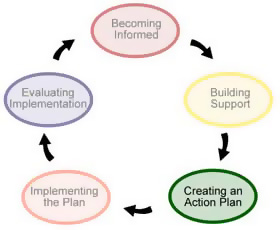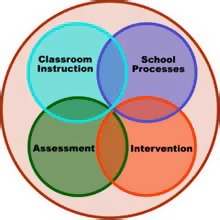What should schools consider when deciding whether or not to adopt the RTI approach?
Page 7: Evaluate School Readiness

Now that Mr. Irwin has completed the building support stage and has gained the support of the key staff at his school, the group is ready to begin the next stage, creating an action plan. This will involve:
- Evaluating school readiness
- Identifying funding sources
- Gaining a school-wide commitment
 Each member of the group has agreed to participate in the planning team. The planning team’s first job is to assess Mayflower’s readiness to implement RTI by using a survey provided by the school district.
Each member of the group has agreed to participate in the planning team. The planning team’s first job is to assess Mayflower’s readiness to implement RTI by using a survey provided by the school district.
Click here to view the school readiness survey that the planning team at Mayflower Elementary will use. The survey, as demonstrated in the example, consists of four indicators, which will later become the objectives for the school’s action plan:
- School processes
- Classroom instruction
- Intervention
- Assessment
The planning team divides into three working groups, each made up of four members, the only consideration being to maintain the representative nature across the working groups. These working groups and the indicators they are assessing are outlined below. Note that one group will assess two of the indicators, classroom instruction and intervention, allowing it to survey instructional practices for all students at Mayflower Elementary.
School Processes Group |
Instruction & Intervention Group |
Assessment Group |
| Left to right: Mrs. Aldridge (School Psychologist), Mr. Brinkerhoff (4th), Mrs. Nguyen (2nd), Mr. Irwin (Principal) | Left to right: Ms. Whitaker (K), Ms. Peden (3rd), Mr. Guiterrez (Parent), Ms. Herron (ESL) | Left to right: Mr. Woodard (Business Partner), Mrs. Pharris (School Counselor), Mrs. Molotiu (1st), Mrs. Ramsey (Special Ed) |
Throughout the next six weeks, the entire planning team meets frequently. During the meetings, each working group presents findings and recommendations on its assigned indicator(s). Then the entire planning team discusses the recommendations and decides on further required actions.
Click on each tab on the Mayflower School Readiness Survey to the right to view each group’s findings.
The planning team has learned that a school typically requires three to six years to effectively implement the RTI approach. After considering the three reports, the planning team determines that Mayflower Elementary will require five years to fully implement RTI. This projected schedule should allow the school time to infuse the components of RTI and to reach the goal of having 90% of its students reading at or above grade level. The Mayflower Elementary planning team develops an action plan, which outlines the major objectives and how they will be achieved, and provides a timeline for when the objectives will be met. Click here to view Mayflower Elementary’s action plan.
 In the creating an action plan stage, principals actively participate in the planning team, they promote common goals, they support collaborative goal-setting and problem-solving, they encourage leadership in others, they recognize when a group requires guidance and intercede respectfully, and they support group decisions.
In the creating an action plan stage, principals actively participate in the planning team, they promote common goals, they support collaborative goal-setting and problem-solving, they encourage leadership in others, they recognize when a group requires guidance and intercede respectfully, and they support group decisions.